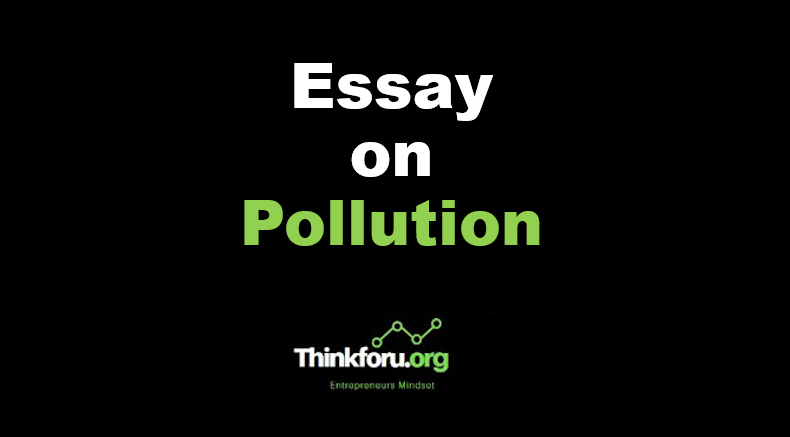Essay on pollution
Essay on pollution
Pollution: A Global Crisis in Need of Urgent Attention
 |
| Cover Image of Essay on pollution |
Introduction:
Pollution is a pressing environmental issue that has emerged as a global crisis. It refers to the introduction of harmful substances or contaminants into the environment, leading to adverse effects on the natural world and human health. With rapid industrialization, urbanization, and population growth, pollution has reached alarming levels, posing significant challenges to the well-being of the planet. This essay aims to delve into various forms of pollution, their causes, consequences, and potential solutions.
Types and Causes of Pollution:
1. Air Pollution:
Air pollution occurs when harmful gases, particulate matter, and other pollutants are released into the atmosphere. It stems from various sources, including industrial emissions, vehicular exhaust, burning of fossil fuels, and agricultural practices. These activities release pollutants like carbon monoxide, nitrogen oxides, sulfur dioxide, and particulate matter, contributing to respiratory ailments, global warming, and the deterioration of the ozone layer.
2. Water Pollution:
Water pollution refers to the contamination of water bodies such as rivers, lakes, oceans, and groundwater. It is caused by industrial waste discharge, improper sewage treatment, agricultural runoff, and oil spills. The release of chemicals, heavy metals, and pathogens into water sources has devastating consequences on aquatic ecosystems, human health, and biodiversity.
3. Soil Pollution:
Soil pollution occurs when the soil is contaminated by toxic chemicals, pesticides, heavy metals, and industrial waste. It results from improper waste disposal, agricultural practices, and mining activities. Soil pollution adversely affects soil fertility, contaminates food crops, and poses risks to human health through the ingestion of contaminated produce.
4. Noise Pollution:
Noise pollution is the excessive or disturbing noise that disrupts the natural environment and human activities. It arises from urbanization, transportation, construction, industrial operations, and recreational activities. Prolonged exposure to noise pollution can lead to hearing loss, stress, sleep disturbances, and impaired cognitive function.
5. Light Pollution:
Light pollution refers to the excessive artificial light that obscures the night sky and disrupts ecosystems. It is primarily caused by street lights, illuminated buildings, and advertisements. Light pollution has negative impacts on nocturnal animals, interferes with astronomical observations, and disrupts natural circadian rhythms in humans.
Consequences of Pollution:
1. Environmental Degradation:
Pollution has severe consequences for the environment, leading to the degradation of ecosystems, loss of biodiversity, and habitat destruction. It disrupts the delicate balance of ecosystems, affecting plant and animal species, and contributing to the extinction of many organisms.
2. Climate Change:
Air pollution, particularly the release of greenhouse gases, contributes significantly to climate change. The increased concentration of carbon dioxide and other greenhouse gases in the atmosphere traps heat, causing global warming and altering weather patterns. This results in rising temperatures, melting glaciers, sea-level rise, and extreme weather events.
3. Health Impacts:
Pollution poses significant risks to human health. Air pollution, for instance, causes respiratory diseases, such as asthma and bronchitis, and increases the risk of cardiovascular ailments. Water pollution exposes individuals to waterborne diseases, while soil pollution can lead to contaminated food and long-term health issues.
4. Economic Losses:
Pollution entails substantial economic costs. The expenses associated with healthcare, environmental cleanup, and mitigation measures place a burden on governments, industries, and communities. Moreover, pollution can harm industries such as tourism and fishing, impacting local economies.
Solutions to Pollution:
1. Transition to Clean Energy:
Shifting from fossil fuels to renewable energy sources like solar, wind, and hydroelectric power can significantly reduce air pollution and combat climate change. Governments should provide incentives and support for the adoption of clean energy technologies.
2. Improved Waste Management:
Implementing effective waste management systems, including recycling, proper waste disposal, and waste reduction strategies, is crucial in tackling pollution. Governments should invest in infrastructure and awareness campaigns to promote responsible waste management practices among individuals, businesses, and industries.
3. Stricter Industrial Regulations:
Enforcing stricter regulations on industries to control emissions and promote cleaner production methods is essential. Governments should establish and enforce stringent environmental standards, encourage the use of cleaner technologies, and impose penalties on polluting industries.
4. Sustainable Agriculture Practices:
Promoting sustainable agriculture practices can help reduce water and soil pollution. Encouraging organic farming, responsible pesticide use, and efficient irrigation methods can minimize the environmental impact of agricultural activities.
5. Reforestation and Conservation:
Protecting and restoring ecosystems through initiatives like reforestation and conservation efforts can help mitigate pollution. Trees play a vital role in purifying the air by absorbing carbon dioxide and releasing oxygen. Preserving natural habitats and promoting biodiversity conservation is essential for maintaining a healthy environment.
6. Public Awareness and Education:
Raising awareness among the public about the harmful effects of pollution and the importance of individual actions is crucial. Educational campaigns, workshops, and programs should be conducted to inform and empower individuals to make environmentally conscious choices in their daily lives.
7. International Cooperation:
Pollution is a global issue that requires international cooperation and collaboration. Governments, organizations, and individuals should work together to develop and implement global strategies and agreements to address pollution, such as the Paris Agreement on climate change.
Conclusion:
Pollution has become a grave global crisis, endangering the health of ecosystems, biodiversity, and human well-being. The diverse forms of pollution, including air, water, soil, noise, and light pollution, have wide-ranging consequences on the environment, climate, and public health. To combat pollution, a comprehensive approach is necessary, involving transitioning to clean energy, improving waste management, implementing stricter regulations, promoting sustainable practices, conserving ecosystems, and raising public awareness. It is imperative for governments, industries, and individuals to prioritize environmental sustainability and take collective action to mitigate pollution and safeguard the planet for future generations.